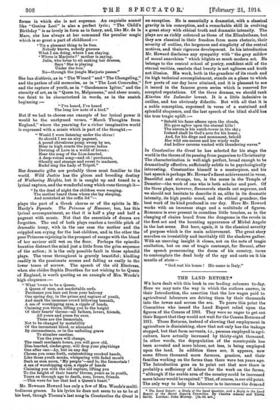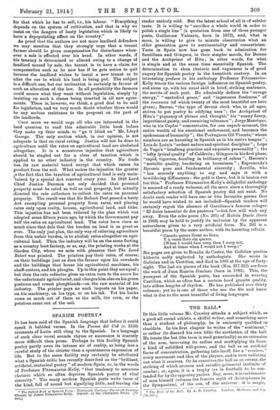THE LAND RETORT.*
WE have dealt with this book in our leading columns to-day. Here we may note the way in which the authors answer, in their Introduction, the assertion that the low wages paid to agricultural labourers are driving them by their thousands into the towns and across the sea. To prove this point the Committee who issued the Land Report relied upon the figures of the Census of 1901. They were so eager to get out their Report that they would not wait for the Census Returns of 1911. Those Returns, instead of showing that employment in agriculture is diminishing, show that not only has the leakage stopped, but that farm servants, i.e., persons employed in agri- culture, have actually increased by thirty-eight thousand. In other words, the depopulation of the countryside has been arrested and more labour, not lees, is being employed upon the land. In addition there are, it appears, now some fifteen thousand more farmers, graziers, and their families working on the farms than there were ten years ago. The Introduction goes on to point out that now there is probably a sufficiency of labour for the work on the farms, "although if the arable area of the country could be increased more labour would be required." That, of course, is our old point. The only way to help the labourer is to increase the demand • 77.. Land Retort: a Study of the Land Vali., and a Raply CO the Land Report of the &out Inquiry Comm:Use. Charles Adenne and Edwin Londont John Nanny. 1.28.6d.not..,
for that which be has to sell, i.e., his labour. "Everything depends on the system of cultivation, and that is why we insist on the dangers of hasty legislation which is likely to have a depopulating effect on the country."
As proof that the authors are not mere landlord defenders we may mention that they strongly urge that a tenant farmer should be given compensation for disturbance when- ever a sale is effected over his head. In other words, if his tenancy is determined or altered owing to a change of landlord caused by sale, the tenant is to have a claim for compensation such as he now has if he gets notice to quit because the landlord wishes to instal a new tenant or to alter the use to which his land is being put. The subject is a difficult one, but our inclination is certainly in favour of o uch an alteration of the law. In all probability the farmers could secure what they want without legislation, simply by insisting on such h clause being inserted in all new agree- ments. There is, however, we think, a good deal to be said for legislation, and we very much doubt whether there would be any serious resistance to the proposal on the part of the landlords.
Once more we would urge all who are interested in the land question to read this admirable little book before they make up their minds to 'go it blind on" Mr. Lloyd George. The only section which, in our opinion, is not adequate is that on rural rating. Justice will not be done to agriculture until the rates on agricultural land are abolished altogether. It is a monstrous injustice that agriculture should be singled out for a class of taxation 'which is applied to no other industry in the country. No trade has its raw material taxed except that which raises its product from the soil. What makes the injustice the greater is the fact that the taxation of agricultural land is only main- tained by a special Act renewed every year. In 1848 Lord Chief Justice Denman not only decided that personal property must be rated as well as real property, but actually .directed the rate collectors to collect the rates on personal property. The result was that Sir Robert Peel passed a hasty Act exempting personal property from rates, and placing rates only upon realty, houses, agricultural land, and tithe. This injustice has not been relieved by the plan which was adopted some fifteen years ago, by which the Government pay half the rates on agricultural land. The rates have risen so much since that dole that the burden on land is as great as ever. The only just plan, the only way of relieving agriculture from this unfair burden, is to abolish rates altogether on agri- cultural land. Then the indu.stry will be on the same footing as a country boot factory, or as, say, the printing works at the Garden City, where we note with pleasure that The Land Retort was printed. The printers pay their rates, of course, on their buildings just as does the farmer upon his cowsheds and the buildings that house his agricultural machines, his chaff-outtere, and his ploughs. Up to this point they are equal; but then the rate collector gives an extra turn to the screw for the unfortunate agriculturist, and charges him also on his green pastures and russet ploughlanda—on the raw material of his industry. The printer pays no such imposts on his paper,
o n his machinery, on his type, or on his ink. Yet his books come as much out of them as the milk, the corn, or the potatoes come out of the soil.















































 Previous page
Previous page